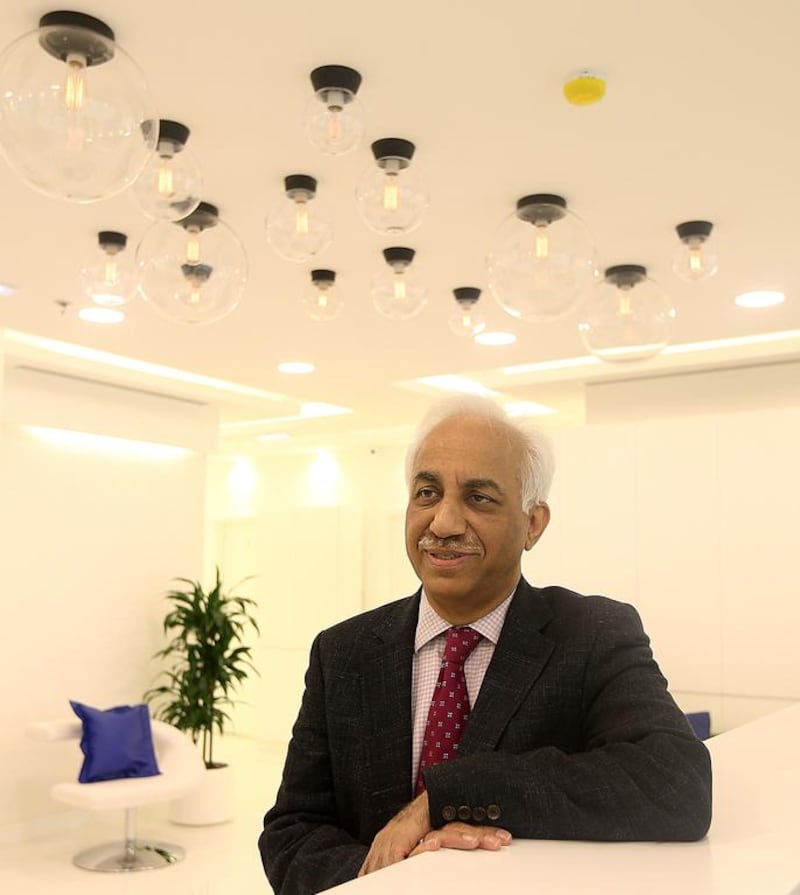DUBAI // In a world where millions of births have been brought about by IVF, a leading doctor in Dubai has said lifestyle and obesity are the biggest factors behind the region’s infertility problems.
Trying to start families later in life, diabetes and smoking are also major reasons that could be restricting a couple’s ability to start a family, said Dr Pankaj Shrivastav, who is director of Conceive Fertility Hospital in Jumeirah Lakes Towers.
The Indian has devoted his professional life to helping couples achieve their dreams of becoming parents and he established Dubai Gynaecology and Fertility Centre upon being invited by the Government to set up the UAE’s first fertility unit.
During his 13 years there, he celebrated the birth of the country’s first IVF baby, in July 1992, and was involved in more than 2,000 other births.
“Infertility is an issue everywhere, not just in the Middle East,” he said. “Fifteen per cent of couples have difficulty having babies at all, or are struggling to conceive for a second time.
“Certain problems are more prevalent in this part of the world, such as Polycystic Ovarian Syndrome, mainly due to genetics but also lifestyle changes like obesity and diabetes.
“Women in the UAE are at a higher risk of developing PCOS because of higher diabetes levels.”
About 25 per cent of adults in the UAE have diabetes. High insulin produced as a result of diabetes damages egg production.
Dr Shrivastav studied 500 couples. Of the women, he found that 38 per cent from the subcontinent had PCOS; 32 per cent of Gulf Arab women had it; and 14 per cent of the Caucasian women had it.
Many men in the region are unwilling to acknowledge a problem with their fertility, as smoking, binge drinking and recreational drugs all have a damaging affect on sperm quality, Dr Shrivastav said.
“In 1991, when I started at Rashid Hospital, we used to see women coming in with their mother-in-laws to seek help for male fertility,” he said, adding that men would stay away while their wives would ask if their husbands could attend in secret.
“Most men would like to believe fertility is a female issue but that is not the case. In the Arab culture, men do not want to have their manhood questioned.”
Since 2004, Dr Shrivastav’s clinic has helped 2,900 babies arrive into the world. Doctors there see about seven new patients a day.
In Britain, 2 per cent of all babies now start life in a clinic through some form of reproduction treatment.
Age is a major issue with regards to female fertility. A woman’s fertility peaks at about 28, before declining steeply after age 38. After 40, the number of eggs become less and the number that are abnormal rises.
By 45, about 90 to 95 per cent of a woman’s eggs are abnormal, which means they are less likely to get pregnant and there is a higher risk of birth defects. However, it is not an issue for men, who can still be fertile in their 70s.
One of Dr Shrivastav’s patients, a woman from Singapore called Karan, eventually got the child she desired through in vitro fertilisation (IVF), where an egg is fertilised by sperm outside the body and then implanted.
“I had been married for 10 years but had been trying for seven,” she said. “I had a fallopian tube blockage on one side.
“It was an emotional rollercoaster to finally become pregnant. The doctor walked us through the journey, as it was more difficult than a normal pregnancy.
“My son Pranav is now eight. He is a fabulous, fun boy and there are no issues with his health. He has changed our lives completely.”
Karan is pregnant again, after a second course of IVF treatment, and is due in August.
Male infertility can be treated with intra-cytoplasmic sperm injection (ICSI), where doctors can pick up a single sperm in a fine needle, one-tenth the thickness of a human hair, and inject it into the egg. The technique has existed since 1991.
One German patient, A T, 39, had been trying for a baby with his 39-year-old wife for five years before undergoing ICSI and producing twins.
“We both underwent fertility tests and we found that there was a problem with my sperm, they were slow swimmers,” he said.
“There were not enough sperm moving at the right speed, so there were problems fertilising the egg.
“We began the treatment, but it took time. We had two misconceptions. The procedure has a 40 per cent success rate so we knew it would not be immediate and were prepared to wait.
“When we found out my wife was pregnant, it was an overwhelming feeling after we had been trying for so many years.”
nwebster@thenational.ae






